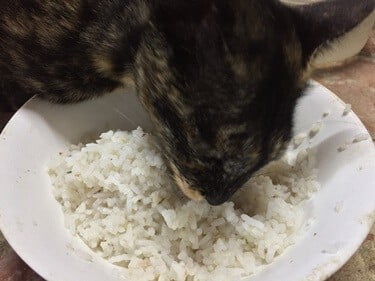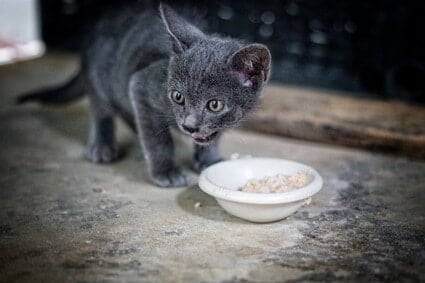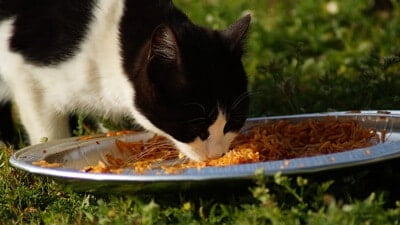Cats should be fed a protein-rich diet, with specialist cat foods providing essential nutrients and vitamins. Human food, which usually contains more fiber and carbs than cats’ bodies need, can harm the feline digestive system. However, a bowl of rice and chicken can be beneficial for cats with gastric problems.
A cat with a bad stomach and diarrhea can be fed brown rice and chicken. The fiber in the rice firms up the stool, while the protein in chicken provides energy. Chicken liver contains more taurine (an amino acid) than chicken breast. The meat should be boiled, de-boned, chopped up, and unseasoned.
Rice and chicken take longer to digest due to the high fiber and protein content, leaving your cat feeling full. This meal should be reserved for gastric episodes, as most cats will grow bored of the bland taste.
Is Chicken and Rice Good for Cats?
Normally, cats should only be fed specialist feline foods selected to meet their dietary needs. Breed, age, and health conditions are considered when choosing a brand.
However, there are occasions that tinned cat food is inappropriate, such as when a cat has diarrhea. Cats have sensitive stomachs that are easily upset.
Sudden-onset feline diarrhea can be caused by:
- Dietary changes
- Excessive grass consumption
- Allergic reactions to food or environment
- Intestinal parasites, such as worms
- Stressful situations
In the aftermath of an upset stomach, more care will be required. Food must be withheld for 12 hours. When the cat is ready to eat again, bland food, such as chicken and rice, can prevent a repeat episode.
Nothing in this meal will further irritate your cat’s stomach, but it can help a cat with a bad stomach to recover sooner. So, chicken and rice are suitable for cats in certain circumstances.
Why Is Chicken and Rice Healthy for Sick Cats?
A sick cat needs to eat to rebuild its strength but may reject wet or dry cat food (kibble.) The cat’s stomach cannot easily process rich, fatty nourishment immediately after a bad stomach and diarrhea.
Chicken and rice provide cats with energy/calories without making the sickness worse. This basic meal is low in fat, and there are no additives or preservatives, making the meal easier to digest.
The chicken will be a good source of quality protein. This will ensure that your cat has the amino acids needed for energy while keeping its immune system strong.
The high fiber content will fill a cat up and firm up your cat’s waste. Before too long, your cat’s diarrhea will be replaced by solid stools again.
How To Feed A Cat Chicken and Rice
Feeding a cat chicken and rice begins with choosing the right ingredients. You’ll need the highest-quality meat as it’ll be more nutritious—the darker the poultry, the better, as it contains more taurine.
As obligate carnivores, taurine is an essential amino acid that a cat’s body can’t produce organically. This means that cats need to get taurine from a dietary source.
Nutrition Research explains that chicken organs are higher in taurine than breasts, legs, or thighs. You may prefer to use chicken liver. If not, organic chicken breasts will suffice.
Instead of grilling or frying the chicken, you should boil it. Boiling the chicken, and removing the skin, will ensure that it provides pure protein with little (trace) fat. Fat will likely upset a cat’s stomach further.
You’ll need to use brown rice. One cup of brown rice offers around 3.6g of dietary fiber, while the same quantity of basmati rice offers just 0.6g. White rice is nutrient-deficient.
Serving The Meal To Your Cat
A cat on a rice and chicken diet should be fed small, regular amounts. Your cat will have been fasting for around 12 hours, so eating small portions regularly will rebuild its strength.
Cats will initially have a reduced appetite after a stomach upset. Don’t be surprised if your cat turns down food the first time, as it can take a while for the cat to feel hungry again.
If the cat’s hungry, it’ll eat quickly, leading to further diarrhea. The cat’s body isn’t used to large servings of fiber in one sitting. Your cat may initially want more food, but you need to moderate its intake.

Cat Won’t Eat Chicken and Rice
Some cats refuse to eat chicken and rice, which is normal as cats often lose their appetite when feeling sick. While you’ll want to entice your cat into eating, you must avoid certain things.
Don’t add seasoning or spices to the meal. This may make it more palatable to humans, but these ingredients will worsen your cat’s stomach problems.
Chicken and rice are supposed to be a bland meal.
Cat Dislikes Chicken
Cats rarely dislike the taste of chicken, but you’ll need to try other meats if this happens.
Organic turkey is recommended. You could also offer duck, as long as it’s very lean. If your cat is averse to poultry, you could offer ground beef, but it must be boiled thoroughly to reduce the fat content.
It’s tempting to offer fish, as many cats love the taste. Unfortunately, fish can be too fatty for a cat recovering from a stomach upset. The same applies to lamb.
Avoid pork-based meats, such as ham, gammon, and bacon. These meats are high in sodium, leading to dehydration. Diarrhea will have caused your cat to lose fluids, so it can ill afford to lose more water.
Cat Dislikes Rice
Rice doesn’t appeal to all cats, as the taste, size, and texture can be disagreeable.
Ensure that the rice is cooked appropriately. If brown rice is undercooked, it will be tough and chewy; if brown rice is cooked for too long, it can become a textureless mass.
If brown rice is unappealing to your cat, you can substitute it for wholemeal pasta. Boil the pasta and chop it into small pieces. Penne, linguini, and spaghetti are all workable alternatives.
If your cat remains unkeen, consider feeding it meat-based baby food. These meals usually contain rice and can settle a cat’s stomach.

Cat Refuses Solid Food
If your cat’s inappetence is connected to solid food consumption, you can make your cat a chicken and rice broth. A cat that feels ill may be more inclined to eat a liquid meal.
You need to create the base first, which is done with a roast chicken carcass. Cover these bones with water and boil. Once the water has boiled, turn down the pan’s temperature to simmer for 2 hours, and the bones will eventually melt into a broth.
Once you have a broth base, add your ingredients:
- Boil your chicken and weigh out the rice.
- Apply these to the broth and pour the whole mix into a blender.
- Puree your cat’s meal to its preferred consistency.
Can I Give My Cat Chicken and Rice Daily?
All references to feeding a cat chicken and rice are for stomach upsets only.
It’s unlikely that cats will accept this meal regularly anyway. As chicken and rice are simple and bland, it’s comparatively tasteless. That’s fine for a poorly cat that needs to rebalance its digestion following an illness, but healthy cats prefer more flavor.
The fiber found in rice isn’t an essential part of a cat’s diet, and carbohydrates are superfluous. Once your cat’s bowel movements normalize, fiber is no longer needed.
Cats can eat chicken and rice following a gastric episode. Feed your cat chicken and rice for 1-2 days until your cat recovers from its stomach upset. Then, return to regular cat food.

